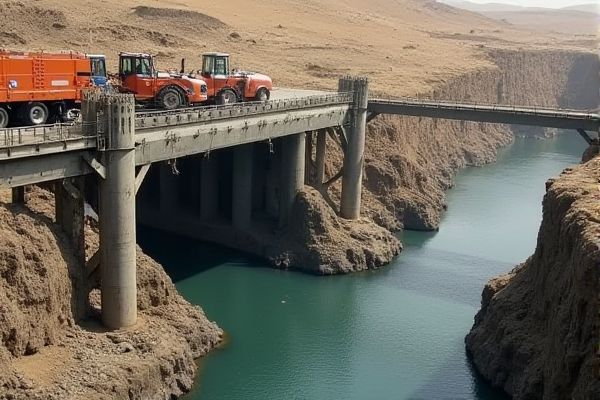
Ethiopia presents a growing demand for hydraulic engineering professionals, driven by extensive infrastructure projects, including dam construction, irrigation systems, and water resource management. Various government and private sector initiatives focus on improving water accessibility and flood control, creating a significant number of job openings in the field. Recent investment in renewable energy projects, particularly hydroelectric power plants, further enhances the need for skilled hydraulic engineers to design and manage these systems. Networking through professional organizations and attending industry-specific conferences can facilitate job searches and provide insights into emerging opportunities in Ethiopia's hydraulic engineering sector.
Job Description
Hydraulic engineering jobs in Ethiopia involve the design and management of water resource projects, ensuring efficient systems for irrigation, flood control, and water supply. Professionals in this field assess local water levels, analyze environmental impacts, and develop sustainable practices tailored to the region's unique challenges. Opportunities often exist within government agencies, NGOs, and private firms dedicated to improving water infrastructure and enhancing public health. You may engage in fieldwork, collaborating with local communities to implement solutions that address water scarcity and promote agricultural productivity.
Requirement
Hydraulic engineering jobs in Ethiopia often require a solid educational background in civil or hydraulic engineering, typically at least a bachelor's degree. Proficiency in hydraulic modeling software and a strong understanding of fluid mechanics are essential skills needed for these positions. Knowledge of local water management policies and regulations can greatly enhance your employability in the field. Experience with sustainable water resource management and infrastructure projects is highly valued, as Ethiopia continues to develop its water supply systems.
Salary and Perks Expected
Hydraulic engineering jobs in Ethiopia offer competitive salaries that can vary based on experience, qualifications, and the specific employer. Entry-level positions typically start at a modest rate, while seasoned professionals can earn significantly higher wages, which reflects the growing demand for skilled engineers in infrastructure projects. Alongside salary, many employers provide attractive perks, including health insurance, housing allowances, and professional development opportunities to enhance your career prospects. The increasing investment in water resource management in Ethiopia presents an optimistic job market for hydraulic engineers looking to make an impact.
Similar Job Names
- Hydraulic Engineer
- Water Resources Engineer
- Civil Engineer - Hydraulics
- Flood Control Engineer
- Hydrology Technician
- Irrigation Engineer
- Water Supply Engineer
- Environmental Engineer
- Drainage Engineer
- Hydraulic Modeling Specialist
- Site Engineer - Hydraulics
- Water Quality Engineer
- Dams Engineer
- Hydraulic Project Manager
- Hydraulics Research Scientist
Job Expectation Concept
Hydraulic engineering jobs in Ethiopia involve designing, constructing, and maintaining systems that manage water resources effectively. This field is crucial for addressing water scarcity, improving irrigation practices, and enhancing flood control measures in various regions of the country. Professionals often engage with government agencies and NGOs to implement sustainable projects that support agricultural development and urban planning. With Ethiopia's emphasis on infrastructure growth, job opportunities in hydraulic engineering are expanding, offering potential career pathways for those dedicated to improving water management.
Career Advantage and Weakness
Hydraulic engineering jobs in Ethiopia present significant career advantages, including a growing demand for infrastructure development due to rapid urbanization and climate change challenges. The Ethiopian government and international organizations are investing in water resource management, irrigation systems, and flood control projects, creating numerous job opportunities in this field. However, the sector also faces weaknesses, such as limited access to advanced technology and training, which can hinder professional growth and project efficiency. Staying abreast of the latest advancements in hydraulic engineering is essential for leveraging these opportunities and overcoming potential obstacles in your career path.
Important Thing Must Know
Hydraulic engineering jobs in Ethiopia play a crucial role in addressing the country's water resource management and infrastructure development needs. Engineers are often involved in projects such as irrigation systems, flood control, and water supply management which are essential for agricultural sustainability and urban development. The Ethiopian government has invested heavily in enhancing water infrastructure, creating a demand for skilled professionals in this field. Developing expertise in hydraulics can lead to opportunities working with international organizations and NGOs focused on water and sanitation projects. Your contributions in hydraulic engineering can significantly impact local communities by improving access to clean water and promoting sustainable practices.
Alternative Career Options
Hydraulic engineering jobs in Ethiopia offer a variety of alternative career options for professionals in the field. You can explore roles in water resource management, which focuses on the sustainable and effective use of water resources for urban and rural areas. Another option is specializing in irrigation engineering, contributing to agricultural productivity and food security through efficient irrigation systems. Consulting firms and governmental agencies often seek hydraulic engineers for infrastructure development projects that enhance water supply and distribution systems.
Companies List
- Ethiopian Electric Power Corporation
- Addis Ababa City Administration
- Ethiopian Roads Authority
- Ministry of Water and Energy
- Ethiopian Railway Corporation
- International Water Management Institute (IWMI)
- Hydro Development Company
- African Development Bank
- World Bank
- NGO and humanitarian organizations working in water and infrastructure sectors
List of Ideal City
Ethiopia offers several cities that serve as hubs for hydraulic engineering jobs, enhancing career opportunities and professional growth in the field. Addis Ababa, the capital, features a growing demand for engineering expertise due to ongoing infrastructure projects and urban development. Dire Dawa is another city to consider, as it is experiencing expansion in water supply and sanitation systems, making it a fertile ground for hydraulic engineers. As you explore job options, assessing local projects and networking with professionals in your desired city can lead to rewarding opportunities in this vital sector.
 jobs-ethiopia.com
jobs-ethiopia.com